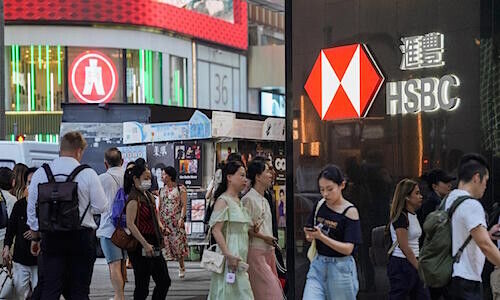HSBC's Hang Seng Deal Bets on Long-Term Gains Beating CRE Risks
The latest deal by HSBC to buy out Hang Seng has obvious negative implications due to worries about commercial real estate risk in Hong Kong. However, some analysts believe that this could be outweighed by long-term benefits such as cost synergies.
Last week, HSBC announced a proposal to privatize Hong Kong-based subsidiary Hang Seng Bank by acquiring its remaining 37 percent stake held by minority shareholders for HK$106 billion ($13.6 billion). The deal values Hang Seng at $155 per share, which marked an approximately 30 percent premium at the time. Hang Seng will retain its own brand, banking license and board.
HSBC will fully fund the acquisition itself and expects to restore its CET1 ratio to its target operating range of 14-14.5 percent through a combination of organic capital generation and not initiating any further buybacks for three quarters.
Since the announcement, Hang Seng’s share price is up around 26 percent while HSBC is down nearly 8 percent.
Bailout Pressure?
One of the most noteworthy concerns in the deal is related to Hang Seng’s exposure to Hong Kong’s commercial real estate (CRE) sector which has been undergoing a continued downturn driven in part by a lack of rental demand and persistent vacancies. Around half of HSBC’s Hong Kong CRE exposure comes from Hang Seng which had HK$25 billion of impaired loans in the sector as of the first half of 2025.
According to a «Bloomberg» report citing unnamed sources, Hang Seng was in the early stages of selling a series of property-backed loan portfolios worth more than $3 billion after HSBC directed its London-based global chief corporate credit officer and the head of its special credit unit three months ago to ensure such a process would commence. Separately, HSBC’s Hong Kong CEO Luanne Lim was named Hang Seng CEO in September, replacing Diana Cesar who became Hong Kong vice chair at HSBC.
Nonetheless, HSBC CEO Georges Elhedery insists that the deal is purely about unlocking growth. In a «Reuters» report, he said that the Hang Seng deal was «absolutely not» driven by pressure to bail out the local lender, adding that the British firm would look at more acquisitions with Hong Kong, UK, transaction banking and wealth named as priority areas for growth.
Analyst Responses
From market analysts, there has been a mix of responses regarding the deal, which is still subject to approvals.
A report by UBS said that there are benefits from increased exposure to the high ROTE (return on tangible equity) market of Hong Kong and reduced operational complexity, though there are also worries about CRE loan provisions. Jefferies has downgraded HSBC from «buy» to «hold» due to lower upside after the removal of the planned $8.5 billion share buyback plan, adding that the Hang Seng deal has a neutral impact on earnings per share before synergies.
«I think parent-subsidiary double listings are inherently problematic in terms of governance and in this sense, it’s a positive and long-overdue move. Of course, HSBC will need to pay a premium so it likely wouldn’t be positive in terms of my fair-value estimate for HSBC but there should be some opportunities for cost synergies,» said Michael Makdad, senior equity analyst at Morningstar.




























